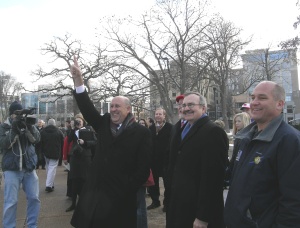Thursday, December 31, 2009
From a commentary by Ken Harwood, a writer for online Capital Region Business Journal, where this column first appeared:Now for the positive side of the energy dilemma. One Wisconsin firm has seen the tidal wave and decided to grab a surfboard and ride it in. I sat down with Scott Neitzel of Madison Gas and Electric and asked about the future of energy production in Wisconsin. Scott shared an MGE initiative, the Energy 2015 Plan, to create economic and environmentally responsible energy. The plan outlines that the company will discontinue burning coal at the downtown Madison Blount Generating Station by 2011, increase its use of wind tenfold, involve the customer in energy efficiency efforts, and secure a cleaner more reliable and affordable product across the board.
To date MGE has made good on the promise. The Blount facility will soon no longer rely on coal, MGE has increased its wind generation from 11 to 137 megawatts, and the company has incorporated new cleaner technologies into its generation facilities portfolio. In addition, MGE has educated the consumer and offers a Green Power Tomorrow program, which allows customers to voluntarily purchase renewable energy for a penny per kilowatt-hour and sell solar energy back to MGE for $0.25 per kilowatt-hour.
Neitzel suggests, “Renewable energy is a part of our corporate culture from the top down.” In describing how they got here he used a sports metaphor from Wayne Gretzky: “You skate to where the puck is going to be, not to where it is.”
The most interesting observation I can make is that MGE was not motivated by current policy or the looming cap and trade initiative. In fact the 2015 Plan was adopted in January of 2006, a full two years before the new administration or current legislative agendas. I learned a lot about balancing good business with good policy from Scott and MGE. I hope this lesson will be shared on Capitol Hill before legislation is drafted. We must remember that energy, the environment and good business is, like surfing, a balancing act. If we are really going to ride the wave to shore, we need to see it coming.






